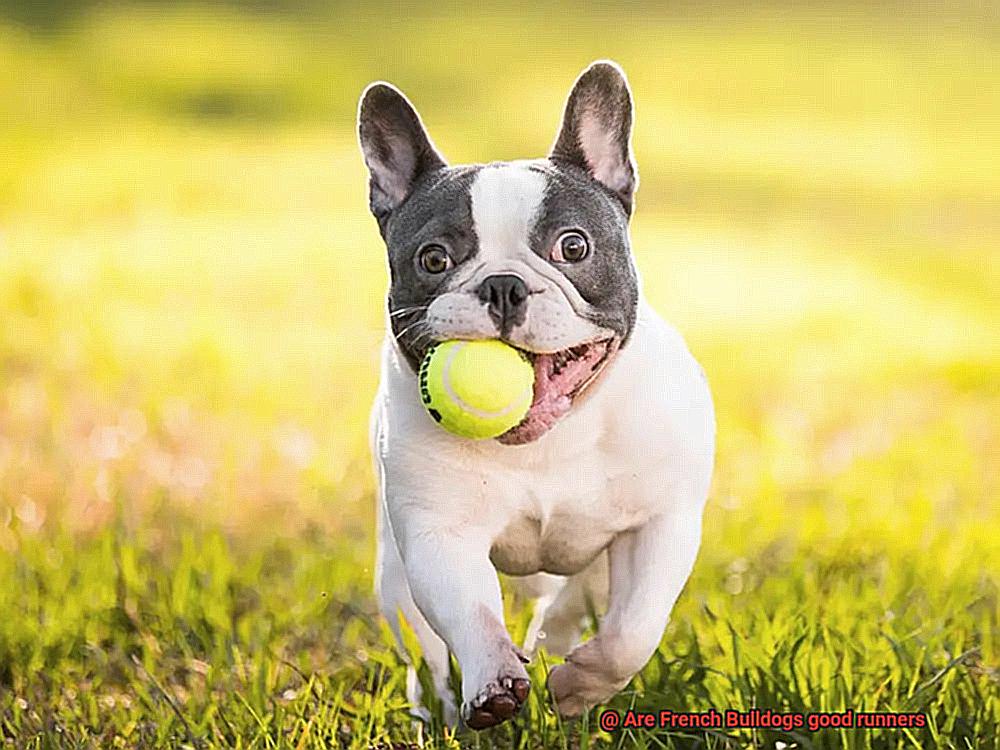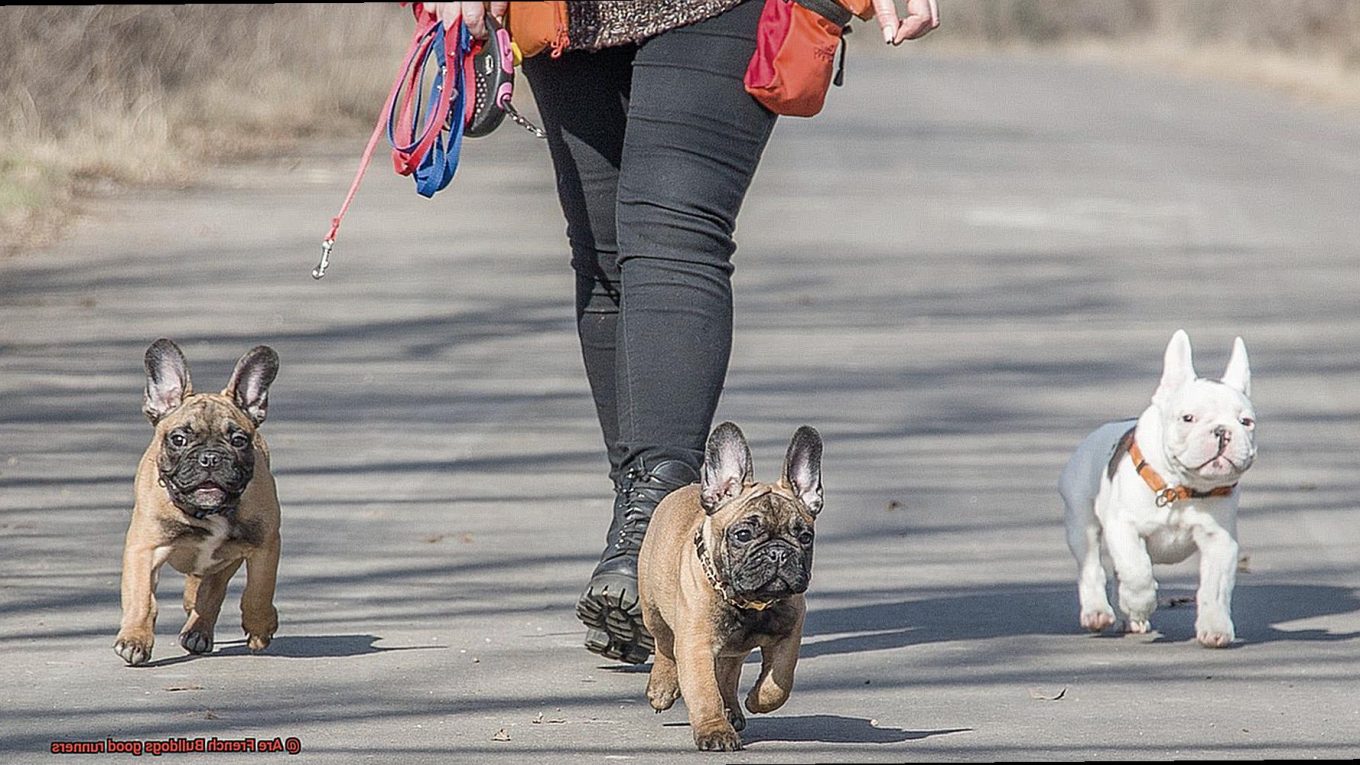Are French Bulldogs good runners?
With their playful antics and unwavering loyalty, it’s no wonder they’ve stolen the hearts of dog lovers everywhere. But here’s the burning question: can these pint-sized pooches keep up with you on your daily jog? We’re diving headfirst into this debate to separate fact from fiction and determine if French Bulldogs are truly cut out for pounding the pavement or if they’re better suited for leisurely strolls and cuddles on the couch.
So lace up your running shoes and join us as we explore whether these lovable pups have what it takes to be your perfect running partner.
How the Anatomy of a French Bulldog Affects Their Running Ability
Contents
- 1 How the Anatomy of a French Bulldog Affects Their Running Ability
- 2 Can French Bulldogs Enjoy Short Bursts of Exercise?
- 3 Not All French Bulldogs are the Same: Consider Your Dog’s Individual Limitations
- 4 Overexertion is a Risk: Monitor Your Dog’s Breathing During Exercise
- 5 Alternatives to Running for French Bulldogs
- 6 Benefits of Walking, Playing, and Mental Stimulation for French Bulldogs
- 7 Consulting with a Veterinarian Before Running With Your French Bulldog
- 8 Tips for Running Safely With Your French Bulldog
- 9 Conclusion
If you own a French Bulldog, you may have noticed that they are not the most athletic breed when it comes to running. Their unique anatomy plays a significant role in their running ability, making it important for owners to understand their limitations.
In this article, we will explore how the anatomy of a French Bulldog affects their running ability and provide some insights on suitable exercises for your furry friend.
The Stocky Build:
French Bulldogs are known for their short and stocky build. Unlike other breeds with long and lean bodies, French Bulldogs have a compact body with well-developed muscles.
While this build gives them an adorable and sturdy appearance, it can make long-distance running a challenge. Their shorter legs and heavy body can strain their joints and muscles, leading to difficulties in maintaining a steady pace and endurance.
The Shortened Snout:
Another factor that impacts the running ability of French Bulldogs is their brachycephalic facial structure. This characteristic, which includes their short nose and flat face, can lead to breathing difficulties during physical exertion. The shortened snout can result in respiratory issues such as brachycephalic airway syndrome, making it harder for them to breathe efficiently while running. It’s important for owners to be aware of these potential breathing problems and take precautions during exercise.
Heat Sensitivity:
French Bulldogs’ compromised respiratory system also makes them more susceptible to overheating. They have a reduced ability to regulate their body temperature, putting them at risk of heat stroke and exhaustion. It is crucial for owners to be vigilant about signs of overheating, such as excessive panting, drooling, or lethargy, and take necessary steps to keep their French Bulldogs cool during exercise.
Individual Variations:
While French Bulldogs as a breed may not excel in long-distance running, it’s essential to note that every individual dog is different. Some French Bulldogs may have better running abilities than others, depending on their overall health, conditioning, and genetics.
Regular exercise and proper training can help improve their stamina and endurance levels. However, it’s important to closely monitor their breathing and energy levels to ensure they are not pushing themselves beyond their limits.
Suitable Exercises:
Given their unique anatomy and potential health risks, French Bulldogs are better suited for shorter, low-impact exercises. Brisk walks or short sprints can provide them with the physical activity they need without putting excessive strain on their respiratory system.
Engaging in interactive play sessions and mental stimulation activities can also help keep them physically and mentally stimulated without overexertion.
Can French Bulldogs Enjoy Short Bursts of Exercise?
French Bulldogs are beloved pets known for their affectionate nature and adorable appearance. However, their unique brachycephalic anatomy poses certain limitations when it comes to physical activities. In this article, we will explore how French Bulldogs can enjoy and benefit from short bursts of exercise, while considering their specific needs and limitations.
Understanding the Anatomy:
French Bulldogs have a flat face and a shortened snout, which makes them brachycephalic. This anatomical feature affects their ability to engage in intense physical activities like long-distance running. They have compromised breathing efficiency and are more prone to overheating.
The Benefits of Short Bursts of Exercise:
While French Bulldogs may not be able to sustain long runs or participate in rigorous activities, they can still reap numerous benefits from shorter, more moderate exercises:
- Energy Release: French Bulldogs have bursts of energy that need an outlet. Short bursts of exercise help them burn off excess energy, ensuring they remain calm and content.
- Weight Management: Regular exercise is crucial for maintaining a healthy weight. Short bursts of exercise can help prevent obesity, which is common among French Bulldogs due to their tendency to gain weight easily.
- Mental Stimulation: Physical activity stimulates the mind as well. Engaging in short bursts of exercise keeps French Bulldogs mentally sharp and prevents boredom.
Exercise Ideas for French Bulldogs:
Here are some exercise ideas that are suitable for French Bulldogs:
- Brisk Walks: Take your furry friend for a brisk walk around the neighborhood. Aim for multiple short walks throughout the day rather than one long walk.
- Play Sessions: Engage in interactive play sessions using toys like balls or ropes. Keep the sessions short but frequent to avoid overexertion.
- Short Sprints: If your French Bulldog enjoys running, incorporate short sprints into their exercise routine. Make sure to provide ample rest breaks in between sprints.
Monitoring and Safety:
When exercising French Bulldogs, it’s important to consider their limitations and monitor their well-being closely. Here are some key points to remember:
- Consult a Professional: Seek advice from a veterinarian or professional dog trainer to determine the appropriate duration and intensity of exercise for your French Bulldog.
- Watch for Signs of Fatigue: Keep an eye out for excessive panting, struggling to breathe, or signs of exhaustion. If these occur, stop the activity and allow your dog to rest.
- Temperature Control: French Bulldogs are sensitive to extreme temperatures, especially heat. Avoid exercising them during the hottest parts of the day and provide frequent water breaks.
-
Not All French Bulldogs are the Same: Consider Your Dog’s Individual Limitations
Not All French Bulldogs are the Same: Consider Your Dog’s Individual Limitations
As a French Bulldog owner and enthusiast, I understand the importance of considering your dog’s individual limitations when it comes to physical activities like running. While French Bulldogs are known for their muscular build and compact size, it is crucial to remember that not all French Bulldogs are the same in terms of their athleticism and endurance.
Brachycephalic Nature
One of the key factors to consider is the brachycephalic nature of French Bulldogs. Their short snouts can make it more difficult for them to breathe efficiently, especially during strenuous activities like running. This can result in them becoming easily fatigued or experiencing breathing difficulties. It is important to observe your dog’s breathing patterns and be cautious when engaging in intense exercise.
Body Structure
French Bulldogs have a stocky build with short legs, which may not be ideal for long-distance running. While their muscular bodies make them great sprinters, they may not have the same endurance as some other breeds. It is essential to recognize your dog’s physical limitations and adjust their exercise routine accordingly.
Health and Physical Condition
Before engaging in any intensive exercise routines, it is crucial to consider your individual dog’s health and physical condition. Consulting with your veterinarian is highly recommended to ensure that your French Bulldog does not have any underlying health issues that could be aggravated by running or other high-impact activities.
Age Considerations
Age also plays a role in determining a French Bulldog’s ability to run. Puppies may have more energy and enthusiasm for running, but their joints are still developing, and pushing them beyond their limits can be detrimental. Older dogs may have joint or muscle issues that can hinder their running capabilities. It is vital to adjust their exercise routine based on their age and condition.
Climate Considerations
The climate and weather conditions also need to be taken into account. French Bulldogs have short coats that make them more susceptible to extreme temperatures, especially heat. Running in hot weather can put them at risk of heatstroke or heat exhaustion. It is important to exercise caution and avoid running during the hottest parts of the day or in extreme weather conditions.
Finding Suitable Exercise
While French Bulldogs may not excel at long-distance running or intensive exercise, they still require regular physical activity to maintain a healthy weight and overall well-being. Shorter walks, play sessions, and low-impact exercises are more suitable for them. These activities can still provide the necessary mental and physical stimulation while considering their limitations.
Observing Your Dog’s Limitations
Every French Bulldog is unique, and what works for one dog may not work for another. It is essential to observe your dog’s individual limitations and adjust their exercise routine accordingly. Watch out for signs of fatigue, overheating, or discomfort during physical activity, and make sure to provide plenty of rest and water breaks.
Overexertion is a Risk: Monitor Your Dog’s Breathing During Exercise
It’s true. Due to their unique brachycephalic anatomy, French Bulldogs need special attention when it comes to physical activity. In this blog post, we’ll dive into the importance of monitoring your Frenchie’s breathing during exercise to prevent overexertion. So, grab a cup of coffee and let’s get started.
Understanding the Risks:
French Bulldogs have a tendency to overheat quickly and can struggle with regulating their body temperature. Their short noses and compact bodies make it harder for them to breathe efficiently, especially during intense exercise. This puts them at a higher risk of heatstroke and overexertion. To keep our furry friends safe and happy, we need to pay close attention to their breathing patterns.

Recognizing the Signs:
So, how do you know if your French Bulldog is overexerting themselves? Look out for signs such as excessive panting, wheezing, difficulty breathing, and an inability to catch their breath. These are red flags that indicate your Frenchie may be pushing themselves too hard. If you notice any of these signs, it’s crucial to stop the activity immediately and provide them with water and a cool environment.
Tips for Monitoring Breathing:
Here are some practical tips to help you monitor your Frenchie’s breathing during exercise:
- Keep an eye on their breathing rate: Take note of how many breaths your Frenchie takes per minute during exercise. The normal range for dogs is 10-30 breaths per minute. If you notice a significant increase or labored breathing, it’s time to take a break.
- Check for effort: Observe the effort your Frenchie puts into each breath. Are they struggling to inhale and exhale? Do they seem to be using their abdominal muscles excessively? These are signs of overexertion.
- Incorporate regular breaks: Give your Frenchie plenty of time to rest and catch their breath during exercise. This will help prevent them from pushing themselves too hard.
Consulting with a Veterinarian:
Remember, every French Bulldog is unique, and their exercise needs may vary. It’s always a good idea to consult with a veterinarian to determine the appropriate exercise levels for your Frenchie. They can provide expert guidance based on your dog’s individual health and fitness level.
Alternatives to Running for French Bulldogs
French Bulldogs are beloved companions known for their adorable faces and affectionate nature. While running may not be the ideal exercise for them due to their physical characteristics, there are plenty of alternative activities that can help keep them active and healthy. In this expert guide, we will explore various alternatives to running for French Bulldogs, ensuring they get the exercise they need while keeping them safe and happy.
Walking:
Walking is an excellent low-impact exercise for French Bulldogs. Regular walks provide mental and physical stimulation, help maintain a healthy weight, and strengthen the bond between you and your furry friend. Aim for two to three short walks per day, focusing on the quality of the walk instead of distance or speed.
Swimming:
If you have access to a pool or a safe body of water, swimming is a fantastic alternative exercise for French Bulldogs. It is gentle on their joints, provides cardiovascular benefits, and helps keep them cool during hot weather. Always supervise your Frenchie while swimming and use a canine life jacket for added safety.
Puzzle Toys and Mental Stimulation:
French Bulldogs have an intelligent and curious nature. Engaging their minds with puzzle toys or training exercises can provide mental stimulation equivalent to physical exertion. Hide treats in interactive toys or teach them new tricks to keep their minds sharp and entertained.
Playdates with Other Dogs:
Socialization is crucial for French Bulldogs, and playdates with other dogs of similar size and energy levels can be a great way to keep them active. Gentle play sessions can provide both mental and physical stimulation while allowing your Frenchie to socialize with their furry peers.
Indoor Games:
When outdoor activities are limited, due to extreme weather conditions or other circumstances, you can engage your Frenchie in indoor games like hide-and-seek or gentle tug-of-war. These activities provide mental stimulation and help burn off energy within a controlled environment.
Remember, before introducing any new exercise routines or activities, consult with your veterinarian. They can provide personalized recommendations based on your Frenchie’s specific health needs and limitations.
Benefits of Walking, Playing, and Mental Stimulation for French Bulldogs
The Benefits of Walking, Playing, and Mental Stimulation for French Bulldogs
Walking: Keep those paws moving.
French Bulldogs may not be Olympic sprinters, but they still need regular walks to keep them healthy and happy. Here are some benefits of walking for French Bulldogs:
- Exercise: Walking provides much-needed exercise for French Bulldogs. It helps them maintain a healthy weight and keeps their muscles toned.
- Joint Health: This breed is prone to certain joint issues, such as hip dysplasia. Regular walks can help strengthen their muscles and joints, reducing the risk of these problems.
- Mental Stimulation: Going for walks allows French Bulldogs to explore their surroundings, stimulating their senses and preventing boredom.
Playing: Fun and games for your furry friend.
French Bulldogs may not be able to compete in a marathon, but they still enjoy playing and engaging in interactive games. Here’s why playing is beneficial for them:
- Physical Activity: While they may not have endless stamina, playing helps keep French Bulldogs physically active and burn off excess energy.
- Bonding Time: Playing games like fetch or tug-of-war strengthens the bond between you and your French Bulldog. It’s a chance for quality time and positive reinforcement.
- Mental Stimulation: Interactive games engage their minds, preventing behavioral problems such as excessive barking or destructive chewing.
Mental Stimulation: Keep those brains sharp.
French Bulldogs are intelligent dogs that require mental stimulation to thrive. Here’s why it’s important:
- Prevents Boredom: Mental stimulation keeps French Bulldogs entertained and prevents boredom-related issues like anxiety or depression.
- Cognitive Enhancement: Engaging them in mentally stimulating activities, like puzzle toys or obedience training, enhances their cognitive abilities.
- Behavioral Benefits: A mentally stimulated French Bulldog is less likely to engage in destructive behavior caused by boredom.
The overall benefits of walking, playing, and mental stimulation
Regular walking, playing, and mental stimulation offer a multitude of benefits for French Bulldogs:
- Weight Management: These activities help maintain a healthy weight and prevent obesity, which is crucial for their overall health.
- Joint Health: Walking and playing promote good muscle tone and joint flexibility, reducing the risk of joint-related issues.
- Energy Outlet: Engaging in these activities provides an outlet for their energy, preventing destructive behavior caused by pent-up energy.
- Mental Well-being: Mental stimulation enhances their cognitive abilities and prevents boredom-related issues.
- Strengthening the Bond: Engaging in these activities strengthens the bond between you and your French Bulldog.
Consulting with a Veterinarian Before Running With Your French Bulldog

If you’re thinking about hitting the pavement with your Frenchie for a run, hold your horses. Before lacing up those running shoes, it’s crucial to consult with a veterinarian. In this article, we’ll dive into why seeking professional advice is a must for the well-being of your four-legged friend.
Unique Anatomy and Breathing Difficulties:
French Bulldogs are known for their adorable squished faces, but this charming feature comes with a downside. Their brachycephalic skull shape means they have shorter snouts and narrower airways, making it harder for them to breathe during intense exercise. Running can put extra strain on their respiratory system, so it’s essential to ensure their lungs and airways are healthy enough to handle the activity.
Joint Health and Orthopedic Issues:
While French Bulldogs may have a compact and muscular body, they’re prone to orthopedic issues like hip dysplasia or intervertebral disc disease. Running can worsen these conditions or even lead to future problems. By consulting with a veterinarian, you can assess your Frenchie’s bone and joint health and determine if running is suitable for them.
Overheating Risk:
French Bulldogs are notorious for struggling with heat regulation due to their unique skull shape. Running intensifies their risk of overheating, which can result in heat stroke or exhaustion. A veterinarian can provide guidance on keeping your Frenchie cool during exercise and recommend appropriate running durations and intensity levels based on their individual tolerance.
Overall Health Assessment:
Consulting with a veterinarian allows for a comprehensive evaluation of your French Bulldog’s overall health and fitness level. They will perform physical examinations, check vital parameters such as heart rate and weight, and run necessary diagnostic tests to rule out any underlying medical conditions that may affect their ability to run safely.
Tips for Running Safely With Your French Bulldog
French Bulldogs are adorable and energetic companions, and running with them can be a great way to bond and keep both you and your pup active. However, it’s important to ensure that you take the necessary precautions to keep your furry friend safe while running. Here are some tips to help you run safely with your French Bulldog:
Warm-up and cool-down
Just like humans, it’s important for French Bulldogs to warm up and cool down before and after a run. Start with a brisk walk for a few minutes to get their muscles warmed up. This helps prevent injuries and prepares their body for the exercise ahead. Similarly, end the run with a slower pace to allow their body to cool down gradually.
Choose the right time and weather
French Bulldogs are brachycephalic breeds, which means they have short snouts and can have difficulty regulating their body temperature. It’s crucial to avoid running with them during extremely hot or humid weather conditions. Opt for early mornings or evenings when the temperature is cooler and the sun is not too harsh.
Use appropriate equipment
Invest in a well-fitted harness instead of using a collar for your French Bulldog while running. Collars can put pressure on their sensitive necks, potentially causing injury or discomfort. Additionally, using a hands-free leash can provide you with better control and stability during your run.
Start slow and gradually increase intensity
French Bulldogs may not be natural long-distance runners due to their compact build and brachycephalic nature. It’s essential to start with shorter distances and gradually increase the intensity and duration of your runs as your dog builds endurance. Remember to listen to your dog’s cues and monitor their breathing and energy levels throughout the run.
Hydration breaks
French Bulldogs can easily overheat, so make sure to bring water along for both you and your dog during your runs. Take regular breaks to offer them water and allow them to cool down. Look out for signs of dehydration such as excessive panting, dry gums, or lethargy.
Pay attention to terrain
Be mindful of the terrain you choose for running with your French Bulldog. Opt for softer surfaces like grass or dirt trails instead of pavement or concrete, as these can be hard on their joints and paws. Avoid running on uneven or rocky surfaces that may pose a risk of injury.
Conclusion
French Bulldogs may not be the first breed that comes to mind when you think of running companions, but don’t let their stocky build fool you. These little dogs are surprisingly agile and can keep up with you on your jogs and runs.
Sure, they may not have the endurance of a Greyhound or the speed of a Border Collie, but French Bulldogs have their own unique charm when it comes to running. Their muscular bodies and sturdy frame allow them to handle short bursts of activity with ease.
One thing to keep in mind is that French Bulldogs do have a tendency to overheat due to their brachycephalic (short-nosed) structure. So, it’s important to take precautions and avoid exercising them in extreme heat or for extended periods.
But on those cool mornings or evenings, when the sun is just right, French Bulldogs can be your perfect running buddy. Their playful nature and love for adventure will make every run an enjoyable experience.
So, lace up your shoes, grab their leash, and hit the pavement together. Watch as their little legs carry them forward with determination and joy. Feel the bond between you grow stronger as you conquer each mile side by side.
In conclusion, while French Bulldogs may not be the ideal choice for marathon training or long-distance runs, they can certainly join you on shorter runs and provide great companionship along the way.




